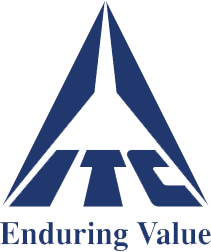 Click here for Menu
Click here for MenuITC is driven by its inspiration to be an exemplary Indian enterprise serving larger national priorities. Spanning all the three sectors of the economy - agriculture, manufacturing and services - ITC's businesses make a unique contribution to the economy. The Company's relentless efforts to pursue extreme competitiveness, make societal value creation the core of its business strategy, invest in game-changing R&D and science-led innovation as well as state-of-the-art infrastructure will contribute to making the future even more sustainable and profitable.
At ITC, the credo of Country before Corporation defines the Company's nation-orientation, and its aspiration to contribute to a future of rapid progress and prosperity.
ITC is inspired by the clarion call to Make in India, given the enormous promise it holds to transform the Indian economy. Make in India can ensure a significantly higher order value capture in the Indian economy, fuelling jobs, maximising revenue and enabling sustainable development.
The Company has transformed itself into a multi-business enterprise with a diversified business portfolio of FMCG, Paperboards & Packaging, Agri-Business, Hotels and Information Technology. This provides ITC a substantial opportunity to contribute meaningfully to the growth and development of the country by creating vibrant businesses of tomorrow. Over 6 million sustainable livelihoods have been created by ITC's businesses and through the empowerment of associated value chains.
ITC has created world-class Indian brands that create, capture and retain larger value within the country. Some of ITC's popular FMCG brands have built significant market standing over a short period of time. These include Aashirvaad, Sunfeast and its sub-brands Dark Fantasy, Delishus, Farmlite, Yumfills, Mom's Magic and Bounce; Bingo!, YiPPee!, B Natural, Candyman, mint-o, GumOn, Kitchens of India and Aashirvaad Svasti in the Branded Packaged Foods space; Classmate and Paperkraft in Education & Stationery products; Essenza Di Wills, Fiama Di Wills, Vivel, Engage, Savlon, Shower to Shower and Superia in the Personal Care Products segment; Wills Lifestyle and John Players in the Lifestyle Retailing Business; Mangaldeep in Agarbattis and Aim in Matches.
It is ITC's aspiration to become India's no 1 FMCG player. The Company aims at achieving a revenue of Rs 1,00,000 crores from the new FMCG businesses by 2030.
The Company has established state-of-the-art brick and mortar assets that add to the nation's industrial prowess. Currently, 65 projects with an investment of Rs 25,000 crores are under implementation or in an advanced stage of planning. These include factories, warehouses, luxury hotels, R&D facilities, office and residential complexes.
ITC has invested in cutting edge R&D to foster breakthrough innovation and create powerful sources of sustainable competitive advantage for the country. With a team of nearly 350 world-class scientists, the state-of-the-art ITC Life Sciences & Technology Centre in Bengaluru is engaged in building future readiness by harnessing contemporary advances in science and technology, applying them in product development and leveraging cross-business synergies. ITC's R&D capabilities are utilised to develop future products in nutrition, health and well-being. In agri-sciences, its efforts are aimed at developing new crop varieties with higher yields and better quality. In a short span of time, ITC has applied for over 480 patents. The intellectual property residing in these filings belongs to India as the country of origin, creating enduring value for the nation.
ITC's multipronged social investment programmes help build the capacity of the weakest in society while its pursuit of a low carbon growth strategy contributes to combatting climate change. ITC's wide spectrum of sustainability initiatives and social investments is manifest in several large-scale programmes covering 166 districts in 26 states.
The celebrated ITC e-Choupal initiative has empowered 4 million Indian farmers. Integrated Watershed Development programmes bring soil and moisture conservation to nearly 2,60,000 hectares. Afforestation initiatives have greened over 2,25,000 hectares, providing more than 100 million person-days of employment. The Women Empowerment programme provides livelihood opportunities to over 50,000 women, which includes a holistic intervention currently supporting over 10,000 ultra-poor and marginalised women towards their socio-economic mainstreaming. The Primary Education programme has reached out to over 4,60,000 children. The Livestock Development programme has covered over 13,00,000 milch animals. ITC's Skilling & Vocational Training Programme has, so far, trained over 31,000 youths and plans to cover 10,000 youths annually. Under ITC's Health & Sanitation programme, over 15,400 individual household toilets have been constructed across the country. In addition, the Company's Wellbeing Out of Waste (WOW) initiative inculcates the habit of sources segregation and waste paper recycling among communities.
ITC is the only enterprise in the world of comparable dimensions to be carbon positive (11 years in a row), sequestering more than twice the amount of carbon it emits; water positive (14 consecutive years), creating water harvesting potential that is thrice the water it consumes; and solid waste recycling positive (for the last 9 years). Over 47% of the total energy requirement of the Company is met from renewable sources, a testimony to its commitment to a low carbon growth path. All ITC's premium luxury hotels have the unique distinction of being LEED® Platinum certified.
Over the past two decades, ITC has built a robust portfolio of businesses spanning FMCG, Paperboards & Packaging, Agri Business, Hotels and Information Technology, leveraging synergies from the Company's enterprise strengths. These encompass deep consumer insight, cutting-edge Research & Development, strong rural linkages, superior agri-sourcing, world-class manufacturing, brand-building skills, culinary expertise, innovative consumer packaging, digital technology and an effective trade marketing, distribution and logistics network.
Today, ITC has an impressive presence in all the three sectors of the economy, namely, agriculture, industry and services, providing unique sources of competitive advantage by harnessing the diversity resident in different businesses. All this has enlarged the Company's capacity to contribute to national priorities and create sustainable livelihoods on a much larger scale.
It is mission critical today to create world-class Indian brands through ownership of intellectual property. It is only then that a virtuous cycle of innovation and investment will create new opportunities for growth and lead to the generation of higher order sustainable livelihoods.
Creation of a new generation of world-class brands demands tremendous staying power with substantial investment commitments over the long haul.
ITC has tirelessly endeavoured to build world-class Indian brands. In a relatively short span of time, a vibrant architecture of popular brands has been crafted organically. Some of them are already clear market leaders in their segments. In aggregate, these new consumer brands currently represent an annualised consumer spend of over Rs. 12,000 crores.
Such world-class Indian brands help create, capture and retain larger value for the Indian economy. In addition to spurring investments and growth, such brands can become a force multiplier for inclusive and sustainable development. By serving as market anchors, these brands can lend relative stability to drive the competitiveness of the entire value chain of which they are a part. This in turn can further empower the weakest in the economic value chain and generate considerable sustainable livelihood opportunities so critical for our country.
ITC's vision to contribute to a sustainable, secure and inclusive future has brought about transformational change, particularly in areas of its engagement in rural India. Apart from ITC's e-Choupal that has helped raise farm productivity and incomes, the Company's social investment programmes have created large-scale sustainable livelihoods along with environmental replenishment that promotes climate change resilience.
These widely acknowledged initiatives include Afforestation, Watershed Development, Livestock Development, Women Empowerment, Primary Education, Vocational Training and Health & Sanitation.
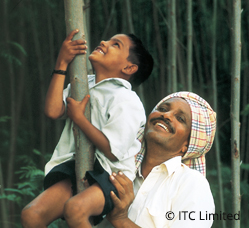
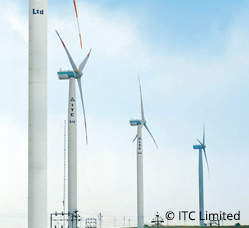
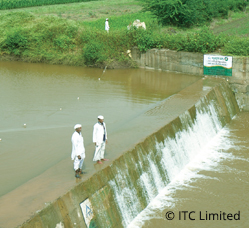
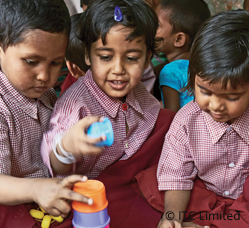
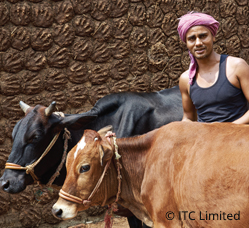
For more details, refer to the section, Sustainability - Contribution to the 'Triple Bottom Line', in the Report of the Board of Directors, and the ITC Sustainability Report.
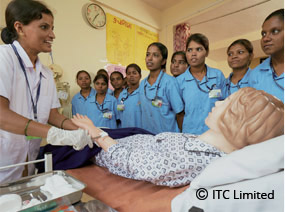
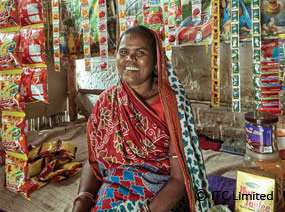
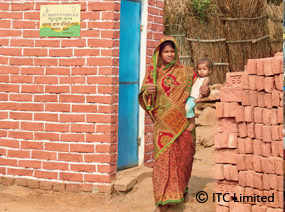
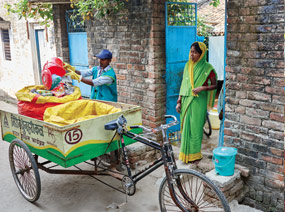
ITC is investing in India's future by building world-class assets that will contribute to the country's competitive capacity. This ambitious investment plan, underpinning ITC's support to the Make in India vision, envisages an outlay of Rs. 25,000 crores in 65 projects across the country.
These include state-of-the-art Integrated Consumer Goods Manufacturing and Logistics facilities, luxury hotels, R&D facilities, office and residential complexes that are being set up across regions, contributing to balanced economic development. These investments will not only add substantially to ITC's competitive ability but also spur livelihood creation along the entire value chain.
At ITC, creating intellectual capital is being driven by a nearly 350-strong diverse pool of highly qualified world-class scientists at the state-of-the-art Life Sciences & Technology Centre in Bengaluru.
In a short period of time, ITC has filed more than 480 patent applications. The distinction does not lie as much in the number of patents filed, as in the fact that the intellectual property resident in these filings belongs also to the country of origin, that is India.
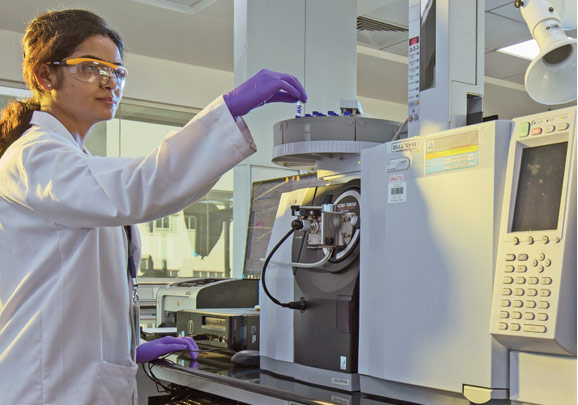
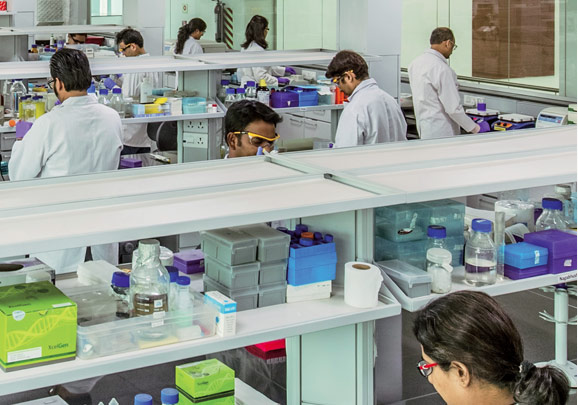
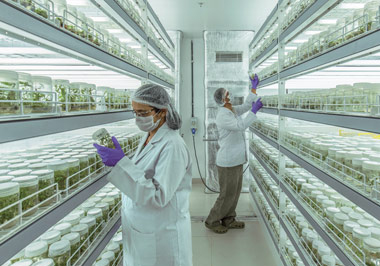
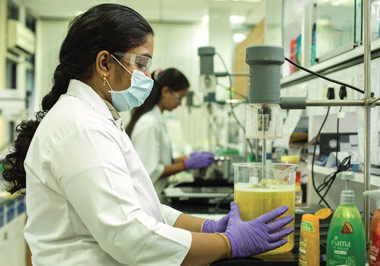
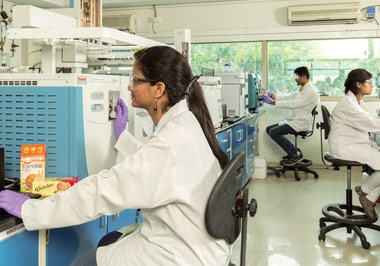
The Directors present the Business Responsibility Report of the Company for the financial year ended on 31st March, 2016, pursuant to Regulation 34 (2)(f) of the SEBI (Listing Obligations and Disclosure Requirements) Regulations, 2015. The Company also publishes annually, a comprehensive Sustainability Report, based on the Global Reporting Initiative (GRI) guidelines.
The details on the aspects discussed in this Report are available in the Company's Sustainability Report. The Company's Board approved Sustainability Policies, ITC Code of Conduct and the Sustainability Report are available on the Company's Website - www.itcportal.com.
| 1 | Corporate Identity Number (CIN) of the Company: | L16005WB1910PLC001985 |
| 2 | Name of the Company: | ITC Limited |
| 3 | Address of the Registered Office: | Virginia House, 37 Jawahar Lal Nehru Road, Kolkata 700 071 |
| 4 | Website: | www.itcportal.com |
| 5 | E-mail id: | enduringvalue@itc.in |
| 6 | Financial Year reported: | 2015-16 |
| 7 | Key products / services: | |
| Businesses | Products / Services | |
| FMCG: | Branded Packaged Foods Businesses (Staples, Snacks and Meals; Dairy and Beverages; Confections); Apparel; Education and Stationery Products; Personal Care Products; Safety Matches and Agarbattis; Cigarettes, Cigars, etc. | |
| Hotels: | Hoteliering. | |
| Paperboards, Paper & Packaging: | Paperboards, Paper including Specialty Paper & Packaging. | |
| Agri Business: | Agri-commodities such as soya, spices, coffee and leaf tobacco. | |
| 8 | Locations where business activities are undertaken by the Company: | The Company's businesses and operations are spread across the country. Details of plant locations, hotels owned / operated by the Company, are provided in the section, 'Shareholder Information', in the Report and Accounts. |
| 9 | Markets served by the Company: | ITC's products and services have a national presence and several products are exported. |
| 10 | Subsidiary companies and their BR initiatives: | The Company has 25 subsidiaries, including 10 subsidiaries outside India as on 31st March 2016. The subsidiary companies define their own initiatives based on their specific context whilst having access to information and expertise residing with the parent company. |
| 1 | Paid up Capital (As on 31.03.2016): | H 804.72 crores |
| 2 | Total Turnover: | H 51,582.45 crores |
| 3 | Total Profit after taxes: | H 9,844.71 crores |
| 4 | Total Spending on Corporate Social Responsibility (CSR): | H 247.50 crores |
| 5 | As percentage of Profit after taxes: | 2.51% |
| Areas listed under Schedule - VII to the Companies Act, 2013 | ITC's interventions (including through Trusts established by the Company) | |
|---|---|---|
| (i) | Eradicating hunger, poverty and malnutrition, promoting health care including preventive health care and sanitation including contribution to the Swachh Bharat Kosh set-up by the Central Government for the promotion of sanitation and making available safe drinking water. | Health & Sanitation, Drinking Water and Eradicating Poverty |
| (ii) | Promoting education, including special education and employment enhancing vocation skills specially among children, women, elderly, and the differently abled and livelihood enhancement projects. | Education, Vocational Training, Livestock Development and generation of Livelihoods |
| (iii) | Promoting gender equality, empowering women, setting up homes and hostels for women and orphans; setting up old age homes, day care centres and such other facilities for senior citizens and measures for reducing inequalities faced by socially and economically backward groups. | Women Empowerment |
| (iv) | Ensuring environmental sustainability, ecological balance, protection of flora and fauna, animal welfare, agroforestry, conservation of natural resources and maintaining the quality of soil, air and water including contribution to the Clean Ganga Fund set-up by the Central Government for rejuvenation of River Ganga. | Environmental Sustainability, Soil & Moisture Conservation and Wasteland Development |
| (v) | Protection of national heritage, art and culture, including restoration of buildings and sites of historical importance and works of art, setting up public libraries, promotion and development of traditional arts and handicrafts. | Protection of national heritage, art and culture |
| (vi) | Rural Development Projects. | Agri Development |
ITC's sustainability initiatives are inspired by the opportunity to serve larger national priorities through a Triple Bottom Line contribution to the economy. It is the Company's deep conviction that businesses possess the transformative capacity to create far larger societal value by leveraging their entrepreneurial vitality, creativity and innovative capacity. This Vision is manifest in the unique models fashioned by the Company to enable the creation of large scale sustainable livelihoods and the augmentation of natural resources.
This Triple Bottom Line commitment of the Company to simultaneously build economic, social and environmental capital has spurred innovation to orchestrate a symphony of efforts that address some of the most challenging societal issues including widespread poverty and environmental degradation. These concerted efforts of the Company over several years have led to the creation of sustainable livelihoods for around 6 million people, many of whom represent the most disadvantaged in society.
While the Company's pioneering work in empowering rural India is a global exemplar, it has also spearheaded several initiatives to achieve new benchmarks in environmental excellence. Recognising that climate change is a threat that particularly makes rural communities extremely vulnerable, the Company has adopted a low-carbon growth strategy. This encompasses large-scale afforestation, increasing use of renewable energy and a continuous quest to maximise natural resource efficiencies across all its operations.
ITC is the only company of comparable dimensions in the world to be carbon positive for 11 years, water positive for 14 years and solid waste recycling positive for 9 years. Its environmental stewardship is also reflected in all its luxury hotels being Leadership in Energy and
Environmental Design (LEED®) Platinum Certified and the increasing share of renewable energy usage in the Company's total energy consumption, which presently stands at 47.3%.
The Company has aligned its policies and guidelines with the principles enunciated under the Business Responsibility Reporting framework on social, environmental and economic responsibilities of business. The context of the BR principles is embodied in the Sustainability Policies and Code of Conduct adopted by the Company, implementation of which is ensured through well-established systems and processes across all its businesses.
For the past 12 years, the Company has published Sustainability Reports encapsulating its performance across the three dimensions of the Triple Bottom Line. ITC Sustainability Report 2015 meeting the latest G4 guidelines of the GRI, 'In Accordance - Comprehensive' category was also third party assured at the highest criteria of 'reasonable assurance' as per the International Standard on Assurance Engagements (ISAE) 3000. The 13th Sustainability Report covering the sustainability performance for the financial year ended on 31st March 2016 and prepared in accordance with the GRI G4 Guidelines, will be available shortly. In addition, the Report and Accounts 2016 of the Company provides a review of the Company's Triple Bottom Line performance.
| ITC Code of Conduct | Freedom of Association |
| Life-cycle Sustainability | Diversity and Equal Opportunity |
| Stakeholder Engagement | Prohibition of Child Labour and Prevention of Forced Labour at the Workplace |
| Responsible Advocacy | Human Rights consideration of Stakeholders beyond the Workplace |
| Product Responsibility | Environment, Health & Safety |
| Responsible Sourcing | Corporate Social Responsibility |
| Sl.No. | BRR Principle | Section in BR Report | Page | Details in ITC Sustainability Report |
|---|---|---|---|---|
| 1 | Businesses should conduct and govern themselves with Ethics, Transparency and Accountability | Corporate Governance for Ethics, Transparency and Accountability | v |  |
| 2 | Businesses should provide goods and services that are safe and contribute to sustainability throughout their life-cycle | Sustainability of Products & Services across Life-cycle | VI |  |
| 3 | Businesses should promote the well-being of all employees | Employee Well-being | VIII |  |
| 4 | Businesses should respect the interests of, and be responsive towards all stakeholders, especially those who are disadvantaged, vulnerable and marginalised | Stakeholder Engagement | X |  |
| 5 | Businesses should respect and promote human rights | Human Rights | XI |  |
| 6 | Businesses should respect, protect, and make efforts to restore the environment | Protection and Restoration of the Environment | XI |  |
| 7 | Businesses, when engaged in influencing public and regulatory policy, should do so in a responsible manner | Responsible Advocacy | XIII |  |
| 8 | Businesses should support inclusive growth and equitable development | Supporting Inclusive Growth and Equitable Development | XIV |  |
| 9 | Businesses should engage with and provide value to their customers and consumers in a responsible manner | Providing Value to Customers and Consumers | XVI |  |
A Board approved policy provides the framework for ITC's corporate governance philosophy, which is anchored on the values of trusteeship, transparency, ethical corporate citizenship, empowerment, control and accountability. ITC believes that since large corporations employ societal and environmental resources, governance processes must ensure that they are utilised in a manner that meets stakeholders' aspirations and societal expectations. ITC embeds sustainability principles in its business strategies, and coupled with corporate governance processes, seeks to ensure superior Triple Bottom Line performance.
| Strategic supervision | by the Board of Directors |
| Strategic management | by the Corporate Management Committee |
| Executive management | by the Divisional / Strategic Business Unit (SBU) Chief Executive assisted by the respective Divisional / SBU Management Committee |
ITC's governance framework enjoins the highest standards of ethical and responsible conduct of business to create value for stakeholders.
For more details on ITC's governance structure, please refer to the section, 'Report on Corporate Governance', in the Report and Accounts.
The role of the CSR and Sustainability Committee is, inter alia, to review, monitor and provide strategic direction to the Company's CSR and sustainability practices towards fulfilling its Triple Bottom Line objectives. The Committee seeks to guide the Company in integrating its social and environmental objectives with its business strategies and assists in crafting unique models to support the creation of sustainable livelihoods. The Committee formulates and monitors the CSR Policy and recommends to the Board the annual CSR Plan of the Company in terms of the Companies Act, 2013.
The CSR and Sustainability Committee presently comprises the Chairman of the Company and five Non-Executive Directors, two of whom are Independent Directors. The Chairman of the Company is the Chairman of the Committee. The names of the members of this Committee and the number of meetings held during the year are provided in the Report and Accounts.
The Sustainability Compliance Review Committee (SCRC) constituted by the Corporate Management Committee presently comprises one member of the Corporate Management Committee (as Chairman) and six senior members of management. The role of the Committee, inter alia, includes monitoring and evaluating compliance with the Sustainability Policies of the Company and placing a quarterly report thereon for review by the Corporate Management Committee.
During the year, three meetings of the SCRC were held to review the implementation of Sustainability Policies and the progress towards sustainability targets.
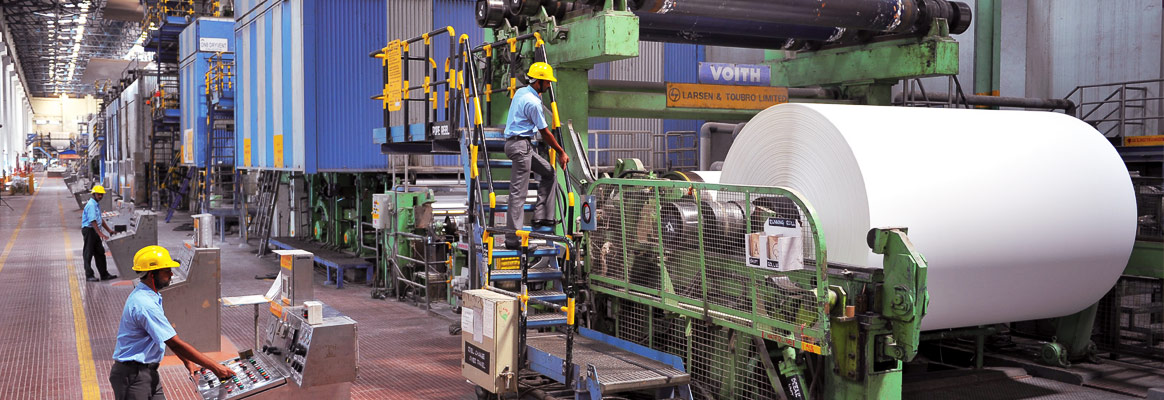
The Company's strategic intent to create enduring value by investing in new engines of growth is powered by its strong and competitive capabilities in R&D, innovation & technology and an array of institutional strengths including deep consumer insights, brand building capability, trade marketing and distribution infrastructure, focus on quality and world-class manufacturing practices, strong rural linkages and outstanding human resources.
The Company endeavours to embed the principles of sustainability, as far as practicable, into the various stages of product or service life-cycle, including procurement of raw material/service, manufacturing of product or delivery of service, transportation of raw materials and finished goods, and disposal by consumers. Policies on 'Life-cycle Sustainability' and 'Responsible Sourcing' detail the Company's approach in this respect.
The Company has been continuously improving on resource use efficiencies, especially that of common resources such as water and energy. Life-cycle Assessment studies have been carried out for some of the Company's products for identifying additional opportunities to continuously reduce environmental impacts across the value chain. Resource efficiency is integrated into product and process design and is a critical component in the creation of physical infrastructure, operations, logistics and waste management.
The Company's concerted efforts in optimising resource use efficiency, for instance, are evident across businesses including the Company's most resource-intensive business, the Paperboards and Specialty Papers Division, where continuous improvements in energy and water usage, have made it amongst the most efficient within the sector. Similarly, the Company's Hotels Division has also demonstrated high levels of resource efficiency by achieving the LEED® (Leadership in Energy and Environmental Design) certification at the highest Platinum level for all its luxury properties. Several of the Company's factories and office complexes have also received the LEED® certification and Bureau of Energy Efficiency's (BEE) star ratings. In order to continually reduce the Company's environmental footprint, green attributes are integrated into all new constructions and are also being incorporated into existing hotels, manufacturing units, warehouses and office complexes during retrofits.

The Company has crafted extensive strategies to ensure sustainable consumption of energy, water and other resources in its businesses. Even though the Company's Paperboards and Specialty Papers Division accounts for nearly 90% of the Company's total energy consumption and water intake, it is an acknowledged leader in low-carbon operations as well as in water usage efficiency. This has been achieved by continuously reducing specific energy consumption, increasing the share of renewable energy sources, afforestation, recycling and reusing internal and post-consumer waste. The Centre for Science and Environment, New Delhi, rated this business as the 'most energy efficient' in the Indian Paper and Paperboard sector (Challenge of the New Balance, CSE, 2010). In 2015-16, the specific water intake (water withdrawn per unit of product or service) at the Bhadrachalam unit was 34% below the standard proposed by the National Productivity Council for large scale integrated pulp and paper mills.
The Hotels Division pioneered the concept of 'Responsible Luxury' and created design interventions, which have enabled optimisation in the usage of energy and water. The LEED® Platinum certification for the luxury hotels of the Company makes 'ITC Hotels' the greenest luxury hotel chain in the world.
The Company has laid down comprehensive guidelines on waste management for all its units, which cover hazardous as well as non-hazardous waste and monitoring of performance for each unit, is carried out on a regular basis.
Vendors/service providers and large outsourced manufacturing facilities are encouraged to adopt management practices detailed under the international standards such as ISO 9001, ISO 14001, OHSAS 18001 and ITC's Corporate Environment, Health and Safety (EHS) Guidelines. Contract manufacturing agreements provide for compliance with accepted standards on issues related to EHS, human rights and labour practices. Most of the out sourced manufacturing units of the Foods Business are already HACCP (Hazard Analysis and Critical Control Point) certified and are working towards improvement in energy efficiency. These interventions are some of the examples of the Company's sustainability practices being adopted by its supply chain network partners.
In order to strengthen sustainable procurement processes, Policies on 'Responsible Sourcing' and 'Human Rights Consideration of Stakeholders beyond the Workplace' have been adopted to address issues of labour practices, human rights, bribery, corruption, occupational health, safety and environment.
The Company works in close partnership with small scale units in businesses such as Safety Matches and Education and Stationery Products. These partnerships have significantly enhanced the competitiveness of a number of units in these sectors.
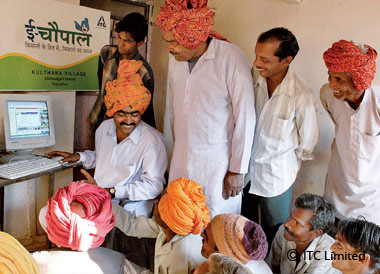
The Company endeavours to integrate sustainability in the procurement process for its products and services across its diversified business portfolio. The Policy on 'Responsible Sourcing' encourages resource efficiency in the supply chain which together with the 'Code of Conduct for Vendors and Service Providers' provide guidance to supply chain members and partners to adopt sustainable practices.
Recognising that poverty in rural India also gets accentuated by inadequate access to knowledge, information, price discovery, quality agricultural inputs and markets, the Company has devised unique models for farmer empowerment. These interventions not only support sustainable agriculture and enhance productivity, but also contribute to substantial livelihood creation.
The Company's globally acknowledged ITC e-Choupal initiative has transformed rural communities into vibrant economic organisations by leveraging information technology to provide real-time information on weather, market prices, agricultural best practices, etc. It also provides customised extension services and training through 'Choupal Pradarshan Khets' (demonstration farms). Farmers have been empowered through the establishment of integrated rural services hubs called 'Choupal Saagars'. The e-Choupal system has enabled efficient sourcing and raised rural incomes. The Company promotes environmentally sustainable farm practices such as zero tilling, micro-irrigation and watershed development. In addition, the Company promotes large-scale afforestation through its Social Forestry programmes. Customised extension services, knowledge of silvicultural practices, and bio-diversity enhancement enrich the farmers' capacity whilst augmenting natural capital. The farmers are free to transact at will and sell to whoever they choose, though the Company stands as a willing buyer.
A climate of creativity and innovation coupled with a culture of care and concern enables 25,564 employees - including 2,244 female employees - of the Company to enhance value creation for all its stakeholders and address the challenges of tomorrow with conviction and confidence. The superior capability of the Company's talent pool is premised on a work culture that nurtures quality talent and promotes a conducive work environment that combines the need to focus on performance and results with a caring and compassionate work ethos. Policies on 'Diversity and Equal Opportunity', 'Freedom of Association' and 'Environment, Health and Safety', among others, guide the management approach on specific elements of the Company's work practices.
The Company's Policy on 'Diversity and Equal Opportunity' is anchored in its fundamental belief that employees with diverse cultural backgrounds bring their own unique experiences, perceptions, knowledge and skills, which when harnessed, strengthen the Company's productivity and ability to proactively respond to changing conditions. Equally, exposure to new ideas, cultures and perspectives encourages the personal growth of employees. The Policy also ensures a work environment that is free from any form of discrimination among employees in terms of compensation, training and employee benefits based on caste, religion, disability, gender, sexual orientation, race, colour, ancestry, marital status or affiliation with a political, religious or union organisation or majority/minority group. In 2015-16, there were no cases of discriminatory employment.
The Company has instituted processes and mechanisms to ensure that issues relating to sexual harassment are effectively addressed. In terms of the Sexual Harassment of Women at Workplace (Prevention, Prohibition and Redressal) Act, 2013, Internal Complaints Committees have been constituted in all units. These Committees are intended to facilitate open and structured discussions on sexual harassment complaints, and to ensure their resolution in a fair and just manner. In 2015-16, 183 employees and 77 Internal Complaints Committee (ICC) members were trained on prevention of sexual harassment at workplace. During the same period, 7 complaints of sexual harassment were received. Whilst 5 of them have been investigated and resolved, 2 of them are currently in the process of being redressed.
The Hotels Division of the Company has been proactively creating awareness on the opportunities for employing people with disabilities among potential employers. The Division has prepared two handbooks to guide industry action in this endeavour -'ITC Hotels Disability Handbook for Industry' and 'A Guide to Universal Design in Built Environments: A Guide for Creating Accessible Building Infrastructure for Persons with Disability'. Presently there are 70 differently abled employees working in the Company, the majority of whom are employed by the Hotels Business.
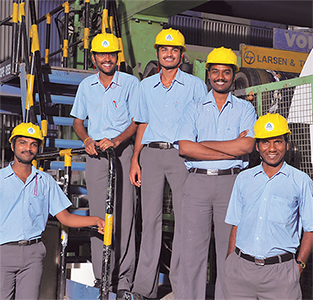
The Company has zero tolerance towards any incident which contradicts its Sustainability Policies. It is ensured that no person below the age of eighteen years is employed in the workplace and forced or compulsory labour is prohibited in all units. The Company does not engage vendors and suppliers who resort to using child and/or forced labour. In 2015-16, on an average, the Company engaged 19,595 employees from 1,776 service providers. Identified service providers have signed the Code of Conduct for Vendors and Service Providers which details labour practices expected of them. Non-compliance with the Code results in termination of contracts. The Company had no cases of child or forced labour in 2015-16.
The health of its employees is a vital area of care and concern for the Company. Employee well-being is ensured through regular medical check-ups and other benefits provided in accordance with medical needs.In addition, most units have a wellness centre and a resident doctor.
Employee Well-being, one of the four constituents of the Company's overall employee relation framework, 'GoodER', is addressed through the following initiatives:
The Company believes all employees are important stakeholders in the enterprise and that building a culture of mutual trust, respect, interdependence and meaningful engagement is imperative. As such, it respects the dignity of the individual and the freedom of employees to lawfully organise themselves into interest groups, independent of supervision by the management. In 2015-16, 11,463 employees were members of unions.
The Company is committed to conducting its operations with due regard for the environment and providing a safe and healthy workplace for its employees. Towards this end, the Company implements best practices and provides appropriate EHS training to employees as well as employees of service providers.
For the Company, learning and development are a business-critical priority for enhancing capability, strengthening the leadership pipeline and fostering employee engagement. Five capability platforms relevant to making businesses future ready have been identified– Strategic, Value Chain, Leadership, Innovation and Human Resources Development. These platforms are also designed to strengthen organisational systems to facilitate speedy and competitively superior responses to market opportunities. In 2015-16, 1,08,735 person days of formal training were provided to employees at various levels which include 16,701 person-days of training dedicated specifically to the environment, health and safety issues.
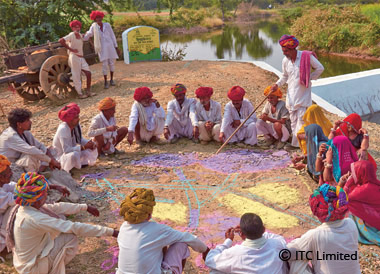
The Policy on Stakeholder Engagement provides the approach for identifying and engaging with stakeholders that include shareholders, customers, employees, farmers, suppliers, communities, civil society, media and the government.
The Company believes that an effective stakeholder engagement process is necessary for achieving its sustainability goal of inclusive growth. Accordingly, it anchors its stakeholder engagement on the following principles:
The Company has put in place systems and procedures to identify, prioritise and address the needs and concerns of its stakeholders across businesses and units in a continuous, consistent and systematic manner. It has implemented mechanisms to facilitate effective dialogues with all stakeholders across businesses, identify material concerns and their resolution in an equitable and transparent manner. These measures have helped the Company develop strong relationships, which have withstood the test of time.
The Company's collaborative partnerships with communities are manifest in its programmes such as watershed development, social forestry, animal husbandry services and women empowerment. These initiatives augment the natural resource base of the nation and create sustainable rural livelihoods.
The Company has Policies on Human Rights applicable to its employees and its value chains. The Policies and their implementation are directed towards adherence to applicable laws and to uphold the spirit of human rights, as enshrined in existing international standards such as the Universal Declaration and the Fundamental Human Rights Conventions of the International Labour Organisation (ILO). During the year, the Company introduced systems to ensure sound implementation of ITC's Sustainability Policies specifically with respect to the Human Rights and a decent work place.
The Company has in place a Code of Conduct for vendors and service providers which have been signed-off by identified Vendors/Service Providers across Businesses, and a Grievance Redressal Procedure to address concerns, if any, pertaining to Human Rights and decent labour practices for its employees.
A system for employees to read and sign-off the Sustainability Policies including Policies on Human Rights and ITC's Code of Conduct was rolled out across Divisions. During the year, 8,587 employees across the Company have been covered, amounting to 94% of the managerial workforce.
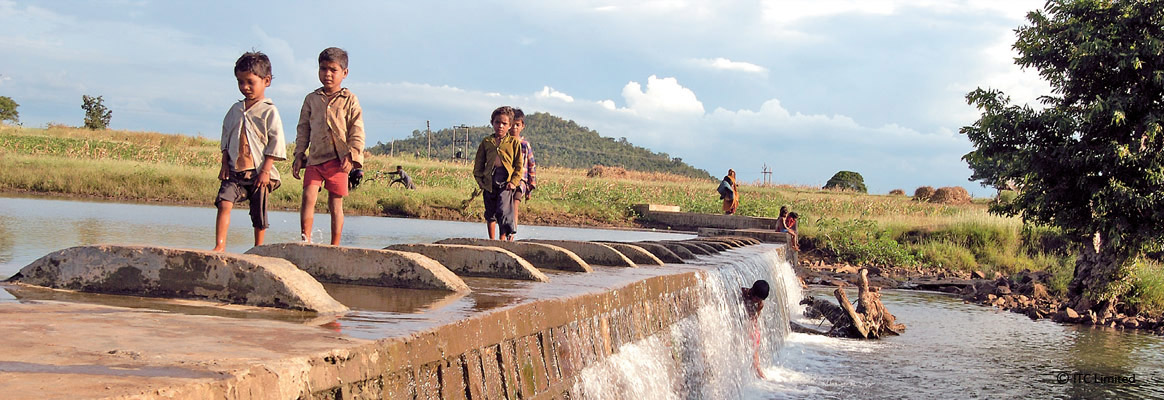
The Company is a global exemplar in environmental sustainability and takes pride in being carbon positive, water positive and solid waste recycling positive for many years. The Company has contributed to environmental stewardship by not only ensuring efficient use of resources but also by augmenting precious natural resources.
The Policies on 'Life-cycle Sustainability', 'Environment, Health and Safety' and 'Responsible Sourcing' provide the necessary direction towards climate change mitigation and adaptation efforts as well as natural resource replenishment initiatives. Such efforts include implementation of a low carbon growth strategy across its businesses, integrated soil and water conservation programmes and the creation of large-scale sustainable livelihoods amongst the marginalised sections of society.
The Company has sought to align with the NAPCC (National Action Plan on Climate Change) of the Government of India to respond to the challenges emerging from the threat of climate change. Some of the measures implemented include continual improvement in specific energy consumption (energy consumed per unit of product or service), enhanced use of renewable energy and expansion of forestry projects to improve the Company's positive carbon footprint.
The Company has also computed its Greenhouse Gas inventory in line with the ISO 14064 standard, which has been assured at the highest 'Reasonable Level' as per the ISAE 3410 standard, by a third-party assurance provider.
The Company has initiated measures across business units to ensure waste minimisation, segregation at source and recycling. For the past 9 years, the Company has been recycling over 98% of solid waste generated by its units and during the year, over 99% was recycled.
The Company has undertaken several water conservation and harvesting initiatives to enhance its positive water footprint. These include continual improvement in specific water intake, adoption of benchmarked practices to achieve zero effluent discharge in the Company's operating units and the establishment of rainwater harvesting structures both within the Company's premises and in the catchment areas of its operations. These initiatives not only lower fresh water intake but also maximise groundwater recharge, reduce run-off and provide precious water to farmers. Most of the Company's units have achieved reduction in their specific water intake and many units have recycled their treated effluents in-house and achieved a zero effluent discharge status.
Carrying forward the Company's extensive work on integrated watershed management, assessments have been carried out at select manufacturing units to ensure water security for all stakeholders at the local watershed level. These initiatives are intended to improve demand and supply side management at the sub-basin level which includes reduction of direct water consumption within the unit, influencing reduced extraction by stakeholders within defined watershed area, augmenting groundwater recharge enhancing surface storage through the rejuvenation and interlinking of existing water bodies, etc. The Company will progressively extend this initiative to other locations.
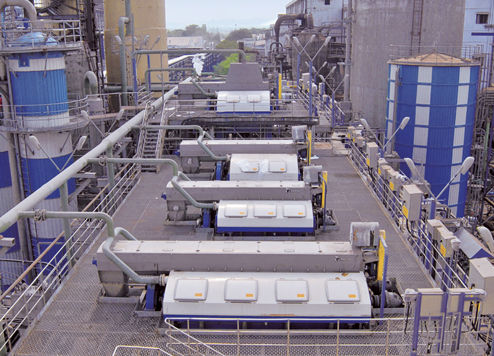
The Company is a pioneer in the green buildings movement, which commenced with the establishment of the ITC Green Centre at Gurgaon in 2004, now one of the highest LEED® Platinum certified buildings in the world. ITC Grand Chola, the 600-key super-premium luxury hotel complex in Chennai, which is amongst the world's largest LEED® Platinum certified green hotel, has also secured a 5 Star Green Rating for Integrated Habitat Assessment (GRIHA) rating, the highest national rating for green buildings in India. Other large infrastructure investments, such as the ITC Green Centre at Manesar(LEED® Platinum certified) and the upcoming ITC Green Centre at Bengaluru (pre-certified for LEED® Platinum) continue to demonstrate the Company's commitment to green buildings.
The Company has also pioneered the manufacture of Elemental Chlorine Free (ECF) pulp & paper/paperboards in India and taken further steps towards cleaner production by introducing 'Ozone bleaching' technology, another first in the country. The Company continues to invest in reducing air emission levels through the adoption of cleaner technologies/fuels, monitoring of combustion efficiencies and investments in state-of-the-art pollution control equipment, such as plasma filters, electrostatic precipitators, etc. Its units monitor significant air emission parameters, such as Particulate Matter (PM), Nitrogen Oxides (NOX) and Sulphur Dioxide (SO2) to ensure compliance with Company standards that are more stringent than regulatory requirements. The Company has made a commitment to reduce dependence on energy from fossil fuels by progressively moving towards meeting 50% of its total energy requirements from renewable sources by 2020. In order to meet this goal, the Company has developed a strategic approach and plans that focus on both energy conservation and renewable energy investments.
In pursuit of its EHS Policy commitments, the Company has established management systems, certified by accredited agencies in line with international standards like ISO 14001 and OHSAS 18001. Within the purview of certified management systems, contingency plans are developed and implemented to prevent, mitigate and control environmental disasters.
An integrated sustainability database management system implemented across the Company ensures monitoring and reviewing of sustainability performance through defined key performance indicators. Standard operating procedures are in place to define, collate and support audits of data for ensuring accuracy and verifiability.
Furthermore, the Company has focused on institutionalising safety as a value-led concept by inculcating a sense of ownership at all levels and driving behavioural change towards the creation of a safety culture. In line with this, behavioural based safety initiatives and custom-made risk based training programmes have been implemented at several units which have resulted in improved safety performance.
The Policy on Responsible Advocacy provides the framework for the necessary interface with Government/Regulatory Authorities on matters concerning the various sectors in which the Company operates. The Company works with apex industry institutions that are engaged in policy advocacy, like the Confederation of Indian Industry, Federation of Indian Chambers of Commerce and Industry, Associated Chambers of Commerce and Industry of India and various other forums including regional Chambers of Commerce. The Company's engagement with the relevant authorities is guided by the values of commitment, integrity, transparency and the need to balance interests of diverse stakeholders.
The Company, for its social development projects, organises meetings with the local administration and state governments to seek their participation and involvement. Their expert advice and counsel are also sought and approvals obtained, where required, for the planned interventions. The Company also engages in public-private-partnerships (PPP) with the state governments for such projects.
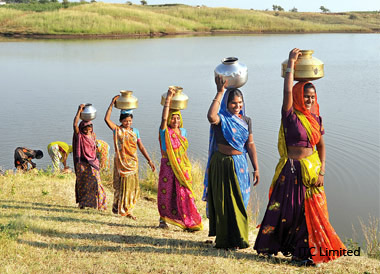
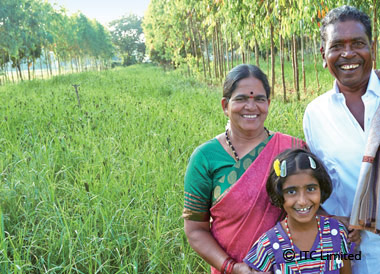
In social sector, the two most important stakeholders of ITC are:
The stakeholder communities face the challenge of securing sustainable livelihoods, which is addressed through the Company's two-pronged approach: Horizon 1: Making today's dominant source(s) of livelihoods sustainable; and Horizon 2: Creating capabilities for wealth generation and employment for tomorrow.
The two horizon strategy has necessitated an integrated approach to development involving several interventions which are summarised below. All programmes are implemented through a mix of national and grass-root level Programme Implementation Agencies (PIAs).
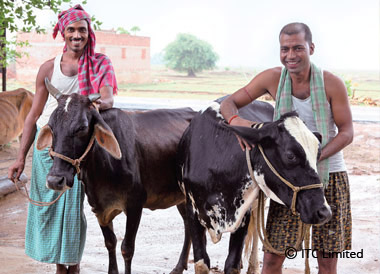
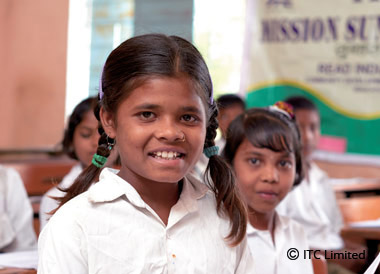
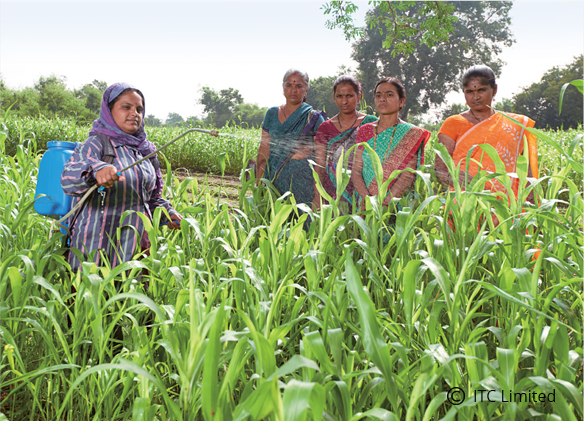
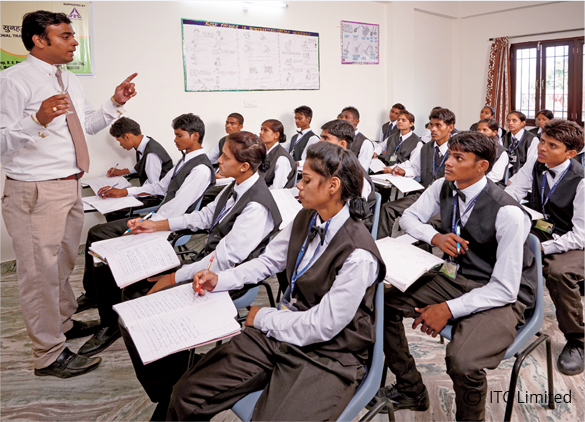
The projects promoted under the Social Investments Programme were spread over 166 districts of 26 states.
The Company has also been collaborating with local municipal agencies to work on sustainable management of community waste. The Programme's aim is to promote a clean and green environment and provide a sustainable source of livelihood for rag pickers and waste collectors.
The Well-being out of Waste (WOW) movement today extends to 400 municipal wards of Hyderabad, Chennai, Bengaluru, Coimbatore and some towns of Telangana covering over 5 million citizens. The Programme creates a sustainable livelihood for 10,000 rag pickers and waste collectors by propagating source segregation at each of the households. Similar programmes are operational in 9 districts of Saharanpur, Hooghly, Kolkata, Munger, Guntur, Madurai, Pune, Thiruvallur and Haridwar also.
The primary focus is on the door-to-door collection of household waste and segregation at the site in order to re-cycle so as to minimise the load at municipal landfills.
As an organisation which upholds and makes significant efforts to ensure good governance, the Company complies with all relevant laws of the land. The Company's uncompromising commitment to providing world-class products and services to customers is supported by its concern for the safety of its customers/consumers. The Company's overall approach on this vital aspect is guided by its Policy on 'Product Responsibility'.
The Company is committed to providing products and services that offer best-in-class quality and user experience. With a continually growing portfolio of businesses that use agri/farm products, the Company endeavours to use sustainably sourced ingredients. The Company adopts stringent hygiene standards, benchmarked manufacturing practices and robust quality assurance systems for its products and the declared product shelf-life is determined based on independently validated studies.

All businesses of the Company comply with all regulations and relevant voluntary codes concerning marketing communications, including advertising, promotion and sponsorship. The Company's communications are aimed at enabling customers to make informed purchase decisions. The Company also makes efforts to educate customers on responsible usage of its products and services.
In addition, the Company's businesses have a dedicated consumer response cell to respond to customer queries and feedback on products so as to be able to continuously improve upon its products and services.
A well-established system is in place for dealing with customer feedback. Consumers are provided multiple options to connect with the Company through email, telephone, website, social media, feedback forms, etc.
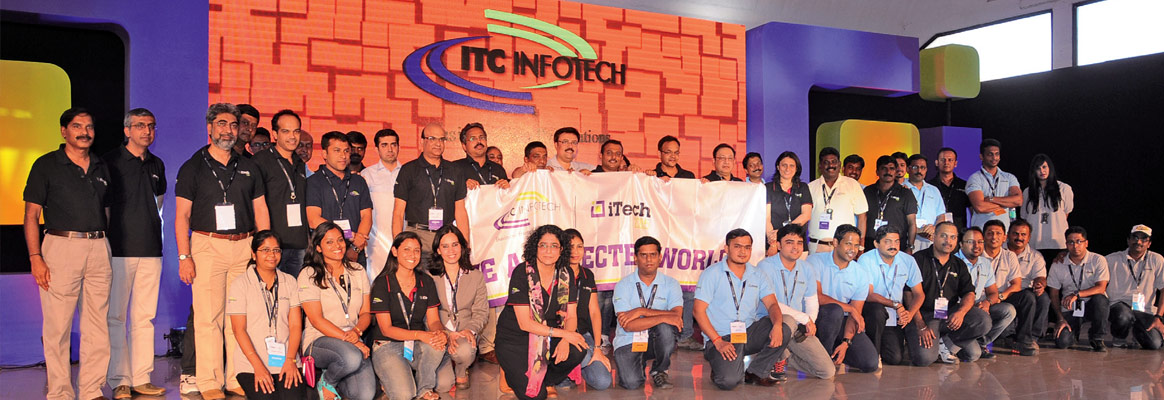
The IT services industry is at a historic inflection point - with traditional IT services and products model getting disrupted. Innovative technologies, new buyers of technology and newer ways of deploying them are beginning to have an impact on the way the industry operates. This disruption has unearthed massive growth opportunities and created a level playing field for nimble technology innovators.
In this context, ITC Infotech has embarked on a transformational journey to become a Specialized, Global scale, Full service provider, led by Business and Technology consulting, and creating enduring value for its stakeholders through excellence across:
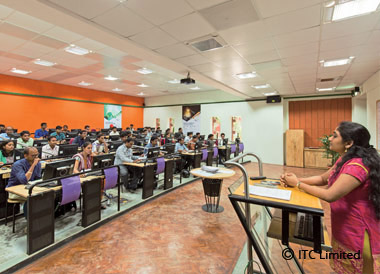
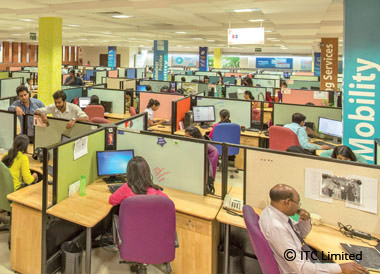
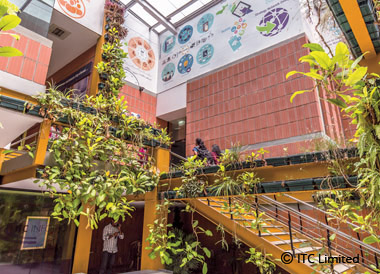
As part of the transformation efforts, ITC Infotech, during the year, has aligned the organization to identified Go-to-market (GTM) industry verticals and Lines of Business (LoB) that can be offered to these target verticals. During the year, Testing as a Service (TaaS) and Supply Chain Management (SCM) were seeded as new LoBs. In addition, the company has also instituted an “Innoruption†lab to focus on R&D and innovation in areas like Digital Supply Chain, Mobility, Internet of Things (IoT), Cognitive Automation and to build an ecosystem of startups.
The company's strategy is beginning to deliver results. During the year, the company saw good traction for its ADM, Infrastructure, Customer experience and Product engineering services and solutions. Strong wins were seen in the digital space among existing clients and new clients.
During the year, ITC Infotech won the “2015 European Outsourcing Awards†in the category: “Value creation in Outsourcing†for its engagement with a leading UK based health retailer. The company was also featured as a “Major Contender†in the Everest Group IT Outsourcing in Banking - Service Provider Landscape with PEAK Matrix™ Assessment 2015 and continued to be featured in the Leader's Category for the 2016 Global Outsourcing 100 by the International Association of Outsourcing Professionals. The company's MD and CEO, Ms. Sushma Rajagopalan was elected as the Chairperson of the IT Services Council of NASSCOM.
In 2015, the company launched 'iTech', an annual technology conference platform to foster innovation. As part of the iTech 2015, ITC Infotech organised a two-day IoT hackathon at its campus in Bengaluru. The event saw over 850 registrations, out of which 30 teams were shortlisted to participate. ITC Infotech will increasingly engage with technology innovators by providing mentorship, partnerships, solution development support, market access and joint go-to-market.
ITC Infotech remains committed to creating a truly diverse workforce, and has adopted a 'source locally, deploy globally' strategy. One such initiative is ITC Infotech's Graduate Program in South Africa, which is designed to enable the company offer “Impact sourcingâ€â€“ a service delivery model that employs high potential but previously disadvantaged individuals.
A unique programme has been initiated to enable employees to be effective Brand Ambassadors for the company. This program is designed to empower InfoTitans with knowledge about the company, it's growth strategy and it's differentiators, so as to create a shared strategic vision. With most elements of the company's strategy already beginning to show green shoots, ITC Infotech is poised to differentiate itself and see strong traction in a dynamic market that is undergoing rapid consolidation.
The CII-ITC Centre of Excellence for Sustainable Development, established by ITC in collaboration with the Confederation of Indian Industry (CII) in 2006, continues its endeavours to promote sustainable business practices among Indian enterprises. The centre is steered by its Advisory Council, headed by Mr Y C Deveshwar, Chairman, ITC Limited, and comprises members from industry, civil society and academia. The Council provides strategic direction to the organisation.
The Centre celebrated its tenth year with its annual Sustainability Summit in September 2015. Expertsand participants from across the country deliberatedon a wide range of sustainability topics at the two-day summit. The year also marked a decade of the CII-ITC Sustainability Awards, instituted to reward and recognise outstanding contributions made by corporates in the field of sustainability. Over the past 10 years, the Awards have set benchmarks of excellence in sustainable business in India. Mr Suresh Prabhu, Union Minister for Railways, gave away the CII-ITC Sustainability Awards to 26 winners across various categories in 2015.
On the International Day for Biological Diversity on May 22, the India Business & Biodiversity Initiative (IBBI), launched by the Centre in 2014, released the publication, 'Bridging Business and Biodiversity:Innovative Approaches'. The publication, released in association with the Union Ministry of Environment, Forest and Climate Change (MoEFCC), highlights the concept of natural capital and its relation to biodiversity and ecosystem services.
During the year, the Centre also launched the Annual CSR Tracker, based on an analysis of CSR disclosures of companies. The tracker analysed 1,181 BSE-listed companies with respect to the amount of funds spent, CSR activities, geographical areas targeted and committees & policies instituted. The centre also launched the Siemens Integrity Initiative (SII), a project aimed at creating awareness on responsible business practices.
The Centre continued to work with the MoEFCC on various legislations and policies concerning business and environment. It provided inputs for the draft “Guidelines on private sector participation for afforestation on degraded forests landâ€, “Use of Multi-layered packaging under Draft Plastic Waste Management Rules 2015â€, and the draft Environment Laws Amendment Bill 2015.
The Centre participated in the 21st session of the Conference of Parties (CoP) to the United Nations Framework Convention on Climate Change held in Paris in the winter of 2015. The climate negotiations was of great significance since a legally binding agreement, which will become operational in 2020, was to be finalised at the event. As India prepared for COP21, the Centre engaged with the MOEFCC on drafting India's Intended National Determined Contributions (INDC). It mobilised inputs from key industry segments, ensuring that industry was fully aligned with the Government on the implementation of the INDCs.
The ITC Sangeet Research Academy (ITC SRA), which was established in 1977, continues to be a true embodiment of ITC's sustained commitment to a priceless national heritage. The Company's pledge towards ensuring enduring excellence in Classical Music education has helped ITC SRA adhere to the age-old 'Guru-Shishya Parampara'. The Academy has eminent musicians imparting quality Hindustani classical music to its scholars. Its list of Gurus includes living legends like Padma Vibhushan Vidushi Girija Devi, Padma Bhushan Buddhadev Dasgupta, Padma Shri Ulhas Kashalkar and Padma Shri Ajoy Chakrabarty. The focus of the Academy is on nurturing exceptionally gifted students, carefully hand-picked across India, who receive full scholarships to reside and pursue music education in the Academy's campus. This has provided opportunities to young talent to train under the tutelage of the country's most distinguished stalwarts and has helped create the next generation of musical masters.

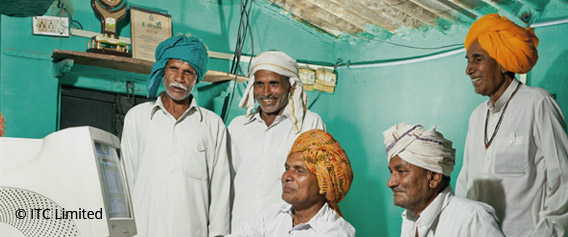
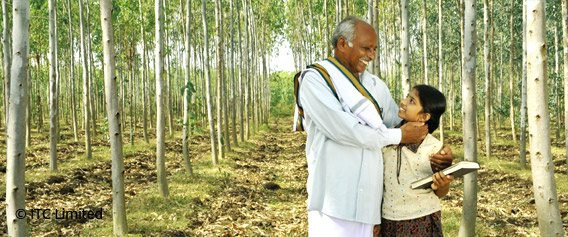

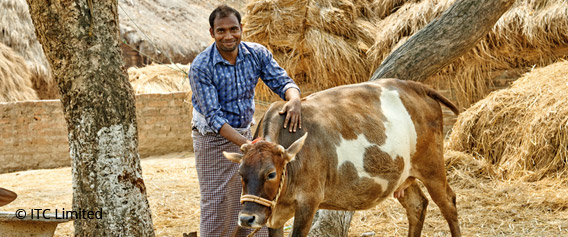
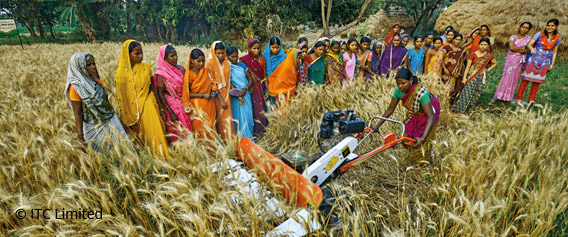
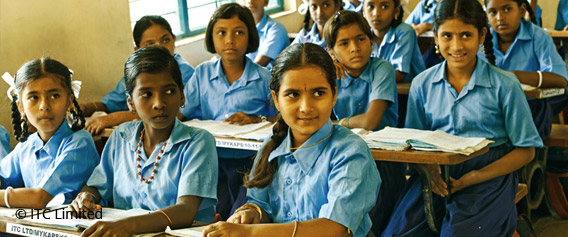

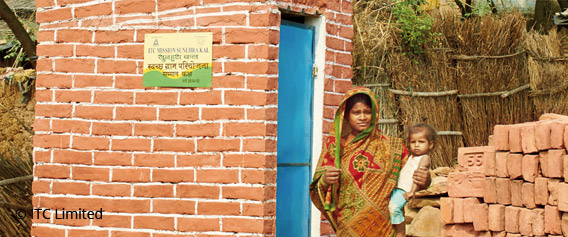
ITC is the only enterprise in the world of comparable dimensions to be Carbon Positive, Water Positive and Solid Waste Recycling Positive.
ITC's businesses and value chains support around 6 million sustainable livelihoods
